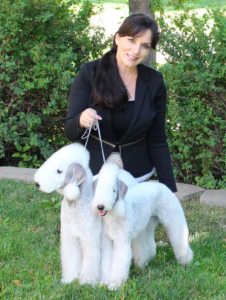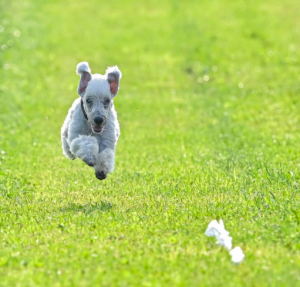Bedlington Terrier: “Head of a lamb and the heart of a lion”
Three Bedlington Terrier breeders -- Laurie Friesen, Gaby Gilbeau and Lucy Heyman -- join host Laura Reeves during Rare Breed Month to share their passion for their unique dogs.
Kissing Cousins?
“So, what we know about the development of the Bedlington is kind of people's best guess,” Laurie Friesen said. “We assume that they were bred with long-legged and short-legged dogs in a litter and the Dandie Dinmont actually evolved from the short-legged variety, where the Bedlington evolved from the long-legged variety. The Bedlington was sort of the poor man's hunting dog and they used them for game to feed the family. They were very tenacious. As the Bedlington evolved they also, because of their tenacity, were used in other terrier breeds … I know the Lakeland has some Bedlington heritage. It's also noted that when the hunt season was over, they were known to be pit fighters.
[caption id="attachment_8002" align="alignright" width="226"] Laurie Friesen[/caption]
“We have a saying in our breed that they have “the head of a lamb and the heart of a lion.” That's one reason we don't spar the Bedlington today. The other thing that's interesting about the history and the hunting ability is we call them sort of a generalist. They were bred to course above the ground as well as go under the ground like your typical terrier.”
Laurie Friesen[/caption]
“We have a saying in our breed that they have “the head of a lamb and the heart of a lion.” That's one reason we don't spar the Bedlington today. The other thing that's interesting about the history and the hunting ability is we call them sort of a generalist. They were bred to course above the ground as well as go under the ground like your typical terrier.”
Versatile competitors
[caption id="attachment_8003" align="alignleft" width="298"]

Gaby Gilbeau[/caption]
“Building on that very colorful past,” Gaby Gilbeau said, “Bedlingtons are really kind of a Jack of all trades kind of dog. They are incredibly smart and unlike a lot of terriers, they're actually very much people dogs. They really care about what their owners think. They are highly intelligent more in tune to what their owner is hoping that they will do, rather than some of the other terrier breeds which may have a little bit stronger of an independent streak. You see them at the highest levels of many of the events that the American Kennel Club offers. We compete in a huge range of activities with our dogs, from barn hunt and earthdog. They’re absolute machines on the coursing ability field. We've actually had some hunt masters ask us to run them against their whippets, just to

see which one will be faster.
“I always say Bedlingtons are the dog world’s best kept secret. They are hypoallergenic. They don't shed, so you have no doggy odor. They are rambunctious enough to still be active with a family with young kids. There's some same sex (dog) aggression sometimes, but you know those are not extremely common. They're great for families. They’re extremely active when you want them to be, like you're gonna go on a five mile hike they're game to tag along. But if you want to sit on the couch and watch Netflix all day, they are also cool to just hang out with you. They're a very versatile dog that really fits a lot of different households.”
Grooming and Health
[caption id="attachment_8000" align="alignleft" width="219"]

Lucy Heyman[/caption]
“The Bedlington coat is very different from a poodle coat or Bichon coat or even a Kerry Blue coat in that it is quite unforgiving,” said Lucy Heyman. “You have to be extremely confident and skilled with the scissors in order to do it properly. That said, a lot of the grooming can be done with a clipper.
“It's every 6 to 8 weeks with the groomers if you're not going to tackle it yourself. I've had clients that have been able to tackle it themselves and turn them out looking like Bedlington should. It certainly isn't beyond the average person’s reach if they work at it.
“For many, many, many years it was well known in the fancy and among the public that Bedlingtons had a disease called inherited copper toxicosis. It is essentially the same disease that humans have that's called Wilson disease. This problem has been virtually resolved in our breed. There are very, very few dogs these days, well under 5%, that are affected when copper toxicosis.”